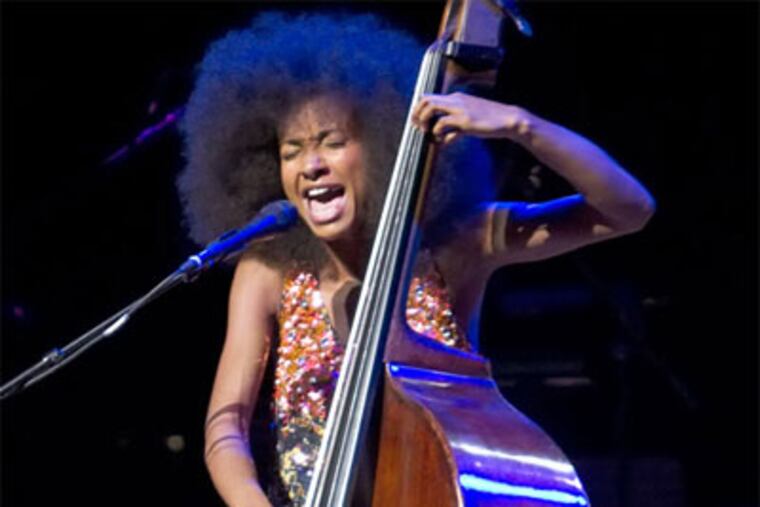Esperanza Spalding plays the Electric Factory
When Esperanza Spalding bested Justin Bieber for Best New Artist at the 2011 Grammy Awards, the upset was greeted by outraged tweets from Bieber’s preteen constituency, shocked fanfare from the jaded jazz community, and confused stares from almost everyone else. If the crowd that gathered at the Electric Factory on Sunday night was any indication, far fewer people are asking, “Who is Esperanza Spalding?” these days.

When Esperanza Spalding bested Justin Bieber for Best New Artist at the 2011 Grammy Awards, the upset was greeted by outraged tweets from Bieber's preteen constituency, shocked fanfare from the jaded jazz community, and confused stares from almost everyone else.
If the crowd that gathered at the Electric Factory on Sunday night was any indication, far fewer people are asking, "Who is Esperanza Spalding?" these days.
That's due in part to a series of very high-profile gigs. She performed at President Obama's Nobel Prize ceremony in 2009 and on The Late Show with David Letterman alongside First Lady Michelle Obama earlier this year, and she sang at the In Memoriam tribute at this year's Oscars ceremony.
It's due also to the infectious R&B leanings of her latest release, Radio Music Society. That crossover album, which was the entire set list on Sunday night, brought in a crossover audience. Younger pop and soul fans roared approval at favorites such as the African American pride anthem "Black Gold," and older jazz fans were disappointed at the lack of seats.
Spalding's nearly two-hour performance captivated both crowds, however, with infectious funk grooves propelled by Lyndon Rochelle's drumming and ample solo space for her skilled 10-piece backing band.
The evening began with the band imitating the sound of a variety of radio stations, as the face of an enormous boom-box lit up and began blasting the sounds of static and voices from a spin around the dial. Spalding strolled onto the stage a few moments later, wearing a white dress and playing the electric bass that would be her main axe throughout the night.
The 27-year-old Spalding has a captivating stage presence, her winsome smile evidencing obvious joy in performing. She spun stories around each song, often in a spoken/sung manner that expanded the tunes with new, improvisatory material. She carried on a gospel-inspired conversation with background singer Chris Turner, accompanied by Leo Genovese's organ, to open "Black Gold," and carried on a conversation with Tia Fuller's alto saxophone, leading into Stevie Wonder's "I Can't Help It." Fuller — no stranger to the big stage as a jazz player whose day gig is touring with Beyoncé — was a fiery standout, as were Jeff Galindo on acrobatic trombone and Jef Lee Johnson on ferocious guitar.